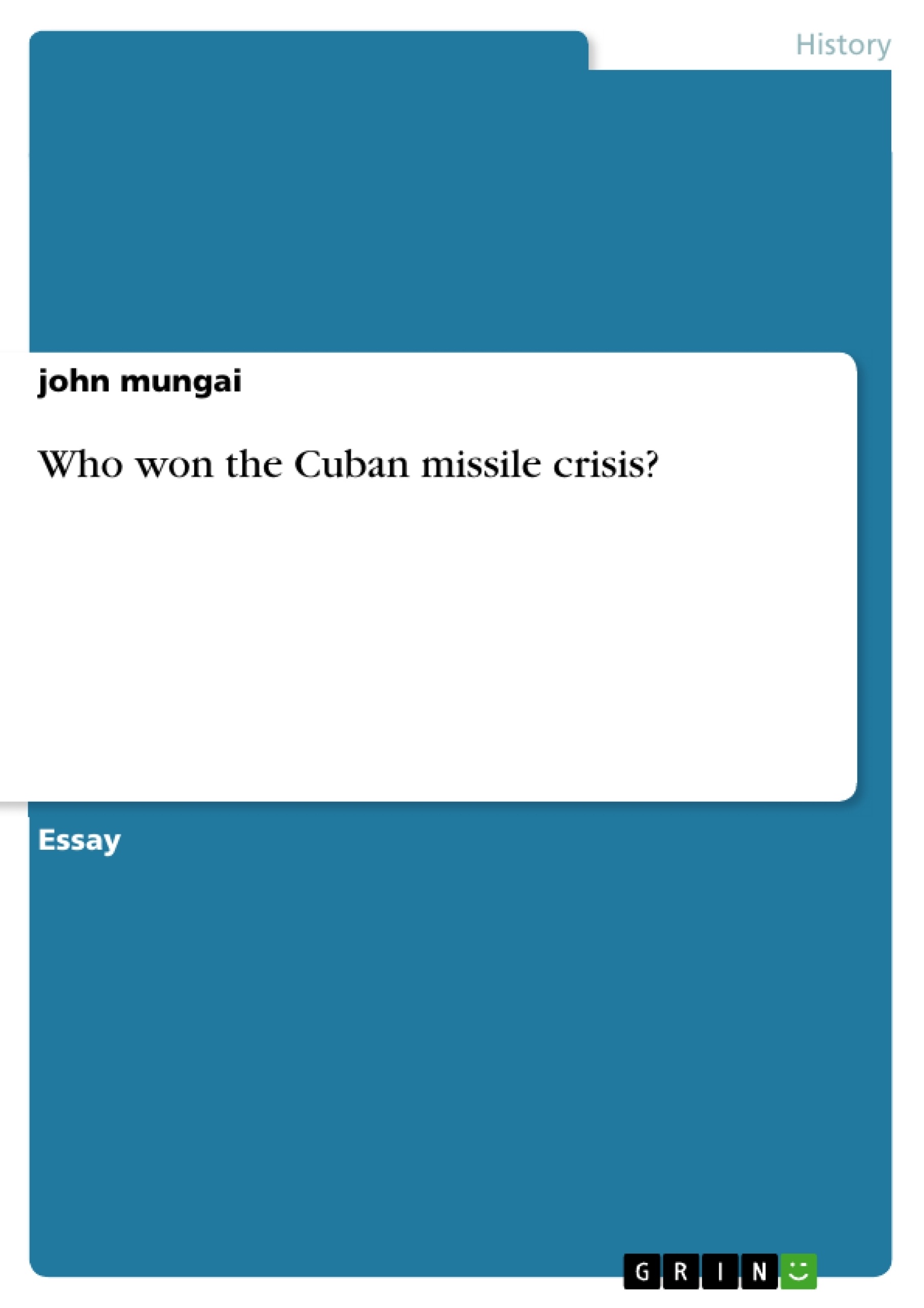Was there a winner in the Cuban missile crisis? And if so, who? During the Cuban Missile Crisis, both the U.S. leaders and the Soviet Union leaders were involved in a 13-day political and military impasse in October 1962 over the installation of nuclear-armed Soviet missiles on Cuba. President John Kennedy notified Americans of the missiles and emphasized that his government was ready to employ military force to neutralize this seeming threat to its national security. Following this declaration, a lot of people were in fear that a nuclear war was almost unavoidable.
However, this possible nuclear war was mitigated when the U.S. gave in to the Soviet leader Nikita Khrushchev’s offer to remove the missiles and in return have the U.S. vacate the Cuban territories. Apart from assenting to this agreement, President Kennedy also secretly agreed to have the U.S. missiles removed from Turkey. Following the U.S. avoidance of the perceived national security threat was a preservation of the complexion of the nuclear rivalry that saw the country dominate over USSR. This paper will argue that it would be justified to proclaim that the U.S. emerged strong during the Cuban Missile Crisis.
Table of Contents
- Unmasking the Puzzle of Who "won" the Cuban Missile Crisis
- The U.S. Domination
- The U.S. Preservation of Nuclear Rivalry
- The U.S. Dissociation of Khrushchev from His Objectives
- The U.S. Victory
- The U.S. and the Soviet Union Concessions
- The U.S. Concurred in the Cuban Missile Crisis
Objectives and Key Themes
This text explores the complex issue of determining who "won" the Cuban Missile Crisis. It examines the actions and motivations of both the United States and the Soviet Union during this critical period, analyzing the concessions made by each side and their impact on the nuclear rivalry between the two superpowers.
- The Cuban Missile Crisis as a defining moment in the Cold War.
- The strategic motivations and objectives of both the U.S. and the Soviet Union.
- The role of nuclear weapons and the potential for nuclear war.
- The impact of the crisis on the balance of power between the U.S. and the USSR.
- The lasting legacy of the Cuban Missile Crisis on international relations.
Chapter Summaries
- Unmasking the Puzzle of Who "won" the Cuban Missile Crisis: This introductory section lays out the context of the Cuban Missile Crisis, describing the 13-day standoff between the U.S. and the Soviet Union over Soviet nuclear missiles in Cuba. It also highlights the fear of nuclear war and the eventual agreement reached to remove the missiles, emphasizing the U.S. perspective of emerging strong from the crisis.
- The U.S. Domination: This section further elaborates on the threat posed by the Soviet missiles to U.S. national security, underscoring the vulnerability felt by the U.S. due to their proximity to American shores. It highlights President Kennedy's public address and the naval blockade imposed on Cuba, emphasizing the perceived inevitability of nuclear war and the U.S. decision to negotiate with Khrushchev for the removal of the missiles.
- The U.S. Preservation of Nuclear Rivalry: This section focuses on the potential impact of the Soviet missiles on the existing balance of nuclear rivalry between the U.S. and the USSR. It argues that the U.S., by giving in to Khrushchev's demands, managed to avoid disrupting its dominant position in the nuclear arena.
- The U.S. Dissociation of Khrushchev from His Objectives: This section examines Khrushchev's motives for installing the missiles in Cuba, including his desire to defend Fidel Castro's regime, bolster Soviet capabilities to strike the U.S., and gain an advantage in Berlin. It contends that while Khrushchev achieved some of his objectives, his failure to deploy the missiles and his eventual concessions indicate a U.S. victory.
- The U.S. Victory: This section delves into the arguments for a U.S. victory, highlighting Khrushchev's concessions and the U.S.'s ability to protect its citizens from nuclear attack. It emphasizes the U.S.'s position of strength, contrasting Khrushchev's perceived vulnerability and his ultimate removal from power.
- The U.S. and the Soviet Union Concessions: This section explores the counterarguments presented by those who believe the Soviet Union won the crisis. It highlights the U.S. concessions, including the promise not to invade Cuba and the removal of its own missiles from Turkey, suggesting that the U.S. was more inclined to yield to Khrushchev's demands.
- The U.S. Concurred in the Cuban Missile Crisis: This concluding section reiterates the arguments for a U.S. victory, emphasizing the U.S.'s nuclear superiority, Khrushchev's ultimate concessions, and the perception of the Soviet Union being overwhelmed and dominated. It asserts that the U.S. achieved its objectives and secured its position in the nuclear rivalry.
Keywords
Key concepts and themes in this text include the Cuban Missile Crisis, the Cold War, nuclear weapons, international relations, national security, nuclear rivalry, strategic motives, concessions, balance of power, and the U.S.-Soviet relationship.
- Quote paper
- john mungai (Author), 2018, Who won the Cuban missile crisis?, Munich, GRIN Verlag, https://www.grin.com/document/453336




